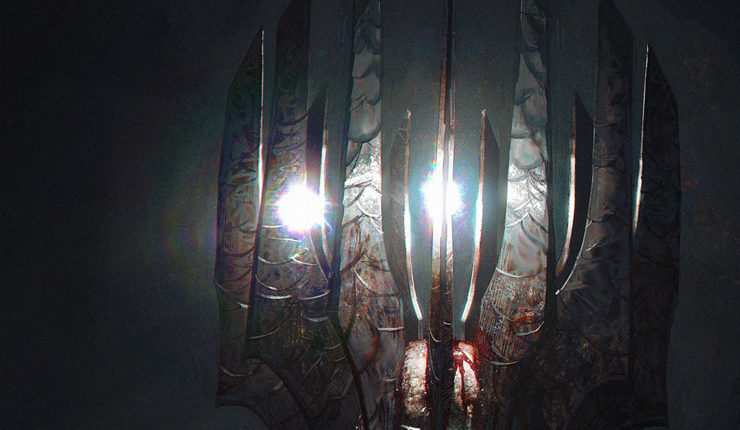In Which Melkor Drops the Other Shoe, Fëanor Rouses a Rabble, and A Promise Is Gravely Made
The dense-but-rich Chapter 9, “Of the Flight of the Noldor,” is like Exposition Central in The Silmarillion. Frankly, it might be easier to summarize what doesn’t happen in this one: Melkor doesn’t stay put. Ungoliant isn’t satisfied. Finwë isn’t long for this world. Fëanor doesn’t let bygones be bygones, nor does he call for solidarity among the Eldar and the Valar. As the Lords of the West sigh wistfully, the Children of the Stars look to eastern shores. And frankly, it’s too much to take in all at once, so this installment will only tackle the first half of this famous chapter.
But let’s get started! That oath of Fëanor’s isn’t going to take itself.
Dramatis personæ of note:
- Yavanna – Vala, grieving arborist
- Manwë – King of the Valar, management
- Fëanor – Noldo, oathtaker, rebel without a (righteous) cause
- Mandos – Vala, tells it like it is
- Melkor – see Morgoth
- Morgoth – see Melkor, still a supreme asshole
- Ungoliant – hungry, hungry spider
Of the Flight of the Noldor, Part One
We open on the Ring of Doom, that circle of thrones where the Valar meet to discuss important things. Melkor and Ungoliant’s Two-Tree deforestation job left a mess, but now the spider-smog has lifted and the air is cleared by the winds of Manwë. But it’s still quite dark in Valinor; the stars, at least, can be seen again. A whole bunch of people—presumably Elves and Maiar—are all gathered around the Valar like an ad hoc town meeting has sprung up. Of course, Fëanor is also present, along with his half-brothers. They are the princes of the Noldor, after all.
Olórin, the Maia who will one day be called Gandalf the Grey, is probably in attendance. He’d have been partying, too, during that big festival before it got party-pooped. Probably hanging out with the children (being fond of smaller folk) and trying out some of his firecracker prototypes. And I’d say it’s also very likely that Curunír is there, too—the Maia who will someday be known as Saruman. No, these two gentlemen of latter-day importance aren’t actually mentioned in this chapter because they play no part yet. But it’s worth mentioning that they bore witness to the Darkening of Valinor, because when these future wizards will conversate and argue thousands of years from now, they are…informed. They listened, they observed. They are wise.
Anyway, Valinor has been darkened. So what now?
We’re only told the big stuff right now, just the major talking points that an Elf might have written down that day. Ulmo, for one, is keeping his mouth shut. He’s too decent a guy to say “I told you so” about Melkor. Though, I just know Tulkas is sitting there, white-knuckled and brooding, on whatever throne of council the others probably have to make him sit on. Or maybe he just paces around all the seats.
But it’s Yavanna—initiative-taking Yavanna who’s been gunning for Melkor ever since the Lamps incident—who has a possible solution. No, she can’t just make new Trees. She’ll never be able to repeat that feat. But hey, what if Fëanor were to, say, lend his Silmarils to her? Remember, he’d actually captured some of the light of the Trees inside them, and so that’s all that’s left of that light now. With some of it, she might be able to salvage all this darkness. Maybe…maybe even rekindle the Trees!
Manwë asks Fëanor if he would concede and let her try, and when Fëanor is not quick to answer, Tulkas gets impatient and tries to hurry him. Only Aulë, the one Vala who would understand a craftsman and artist like Fëanor best, asks them to give Fëanor some peace, some time to think.
But Fëanor already has his answer ready, and it’s one that really starts him down his final path of obstinance. Remember what he thinks of the Valar. He’s already implied that they are like captors and the Elves their thralls. He’s not a fan, Melkor’s lies having wormed their way into his psyche. And now, in front of everyone, the Valar have gone and asked him—him, an exile!—for something. And not in some secret private meeting, but in front of everyone (which I think is important). They’ve put him on the spot. All eyes are on him. So Fëanor draws an immediate comparison between the Valar and himself, pointing out that just as Yavanna cannot remake the Trees, so he cannot recreate what he did in crafting the Silmarils. Moreover:
It may be that I can unlock my jewels, but never again shall I make their like; and if I must break them, I shall break my heart, and I shall be slain; first of all the Eldar in Aman.
And then Fëanor presumably goes on to found the world’s first emo band and write melancholic lyrics about how no one understands him and how even the slightest setbacks in his extremely privileged life wound him to the core of his precious, sensitive soul. Or, at least he would have, if things didn’t go down the way they do.
First off, Mandos immediately chimes in—in his usual, ominous way—which is never a good thing. The Doomsayer of the Valar makes his little interjection right after Fëanor suggests that “breaking” his precious Silmarils would straight-up slay him and he’d thus be the first Elf to die in all of Aman.
‘Not the first,’ said Mandos, but they did not understand his words…
Mandos knows stuff. Stuff he’s not always allowed to talk about. And by this point in history, they’ve probably given up asking him to clarify. At first it seems like he’s just snarkily referring to Míriel, Fëanor’s mother who perished soon after his birth. Technically, she might be the first of the Eldar to “die” in Aman. But then her passing has always been kind of a nebulous thing, hasn’t it? And I don’t think Mandos would just toss that painful reminder out like that. He’s not a jerk. But this means he must know of another of the Eldar who’s just snuffed it. Probably got an alert about it on his Halls of Mandos app: a slain Elf spirit is awaiting its summons. He would be the first to know.
But I find a lot of insight in what Corey Olsen, the Tolkien Professor, said in one of his Silmarillion Seminar podcast episodes about Mandos’s three-word line:
If there’s one thing that he’s communicating clearly, it is, ‘Fëanor, you’re not really as big a deal as you think you are. You are already having delusions of grandeur right here. You are already making yourself out like you’re the entire protagonist of this whole story. Like the Darkening of Valinor is, at the end of the day, all about you. And it isn’t.’
Anyway, we’ll come back to what Mandos is actually referring to.
Finally, after he stews for a while, the much-beleaguered and oh-so-put-upon Fëanor finally declares that he will not give up his Silmarils, even though it could help relight the Trees and bring that blessedness back to Valinor and all his own people:
But if the Valar will constrain me, then shall I know indeed that Melkor is of their kindred.
Clever words, though. This statement puts the Valar in an awkward place. Of course, it’s not even certain that lending his Silmarils to Yavanna and “unlocking” them would even destroy them. It’s, at most, just a possibility. But that’s too much for him. More importantly, it’s what they want him to do.
Forgive me, then, as I bring in a brief quote from another book. Not even a Tolkien book. Rather, from an unrelated story that was published by the professor’s friend C.S. Lewis in 1945. In one scene, a prideful ghost is being offered forgiveness and salvation simply by letting go of his grievances in life and just accepting his lot.
“So that’s the trick, is it?” shouted the Ghost, outwardly bitter, and yet I thought there was a kind of triumph in its voice. It had been entreated: it could make a refusal: and this seemed to it a kind of advantage. “I’d rather be damned than go along with you.”
Lewis and Tolkien both knew a thing or two about pride, mostly from their real world experiences. And they knew how dangerous pride can be—not just by itself, but the ways in which it can drive one’s actions and color one’s entire world view. It sure does color Fëanor’s every move. Pride isn’t about being proud. It’s about wanting to be better than someone else, or at least appear to be, or to have power over someone else.
Fëanor refuses the Valar’s request because he can. He may not be a mighty Vala from the Timeless Halls before Eä was made, but ahh, he can lord his free will over them. He knows they won’t take that from him—they are themselves constrained by Ilúvatar’s rules—so he exploits it. Denying the Silmarils is a petty triumph. Never mind that it was Yavanna’s Trees that supplied their light in the first place, or that it was Varda herself who had hallowed them and made them as powerful as they were.
So the Trees will have to remain extinguished forever. It’s a done deal. Mandos calls it. No use yapping about it any further. And as everyone is forced to sit back and just process this outcome, grey-hooded Nienna goes up upon the mound where they once lived and died. She mourns and weeps, as she does, and washes away the filth of Ungoliant with her tears. And as if this day hasn’t seen enough heaviness…
Messengers arrive from Formenos, Fëanor’s house. You know, that place up in the hills where he keeps all his stuff (and loved ones). They report that a Darkness came upon the place—which we know now is Ungoliant and her Unlight—and out of it had stepped Melkor. The Elves will not have seen him in his Dark Lord shape until now, either, so I have to think that would be a terrifying encounter. But it gets worse: Right there at the gates of Formenos, Melkor attacked and killed Finwë. Killed him dead.
Now, I want to imagine that there was some kind of battle, even a short one. This is Finwë—King of the Noldor, born on the shores of ancient Cuiviénen—we’re talking about. No, he’s not a warrior, not like his sons have groomed themselves to be. So he stood no chance against the mightiest of all the dwellers in Eä. But alas, there were no Elves to witness his end. And why? Because the messengers report that “Finwë alone had not fled from the horror of the Dark.” Which means, I’m pretty sure, that he made sure that his seven grandkids—the sons of Fëanor—and whatever staff the place had made it out of there alive, before turning to face Melkor by himself, perhaps to buy them time.
Finwë, I think it should be observed, was always a great leader. And seemingly a good husband (twice!), up to a point. No, not a great king. But a loving father and grandfather.
Rest in Mandos, Finwë. Hopefully his reunion with Míriel won’t be too awkward.

And yet we’re still not done with the bad news. After committing his act of regicide, Melkor broke into the iron vaults and lifted the three Silmarils. That’s the final straw! And as kind of a footnote, he also took “all the jewels of the Noldor that were hoarded” there. Which has to be a lot.
Hearing all this, Fëanor is thrust into a decidedly dark place. This is his dad that’s just died—and the answer to Mandos’s “Not the first” riddle. And let’s not forget, though it’s easy to, that Finwë was also Fingolfin’s and Finarfin’s dad. And young Galadriel’s grandpa, too! But Fëanor isn’t exactly concerned with anyone else’s feelings just now (or, well, ever). And in truth, we’re kind of with him in this moment anyway. He’s not a bad guy…yet.
First things first: Fëanor curses Melkor and then renames him in front of everyone there at the Ring of Doom. And when Fëanor declares something, it sticks. So now Melkor is rebranded Morgoth, the Black Foe of the World, “and by that name only was he known to the Eldar ever after.” Like, sure, Melkor is going to keep referring to himself as Melkor, but if he writes checks under that name, they’re going to bounce. It’s like Arda’s metadata has been adjusted. Fëanor has made sure that history will be written with this new moniker.
Which reminds me, it’s time to update Melkor’s, err, Morgoth’s list…
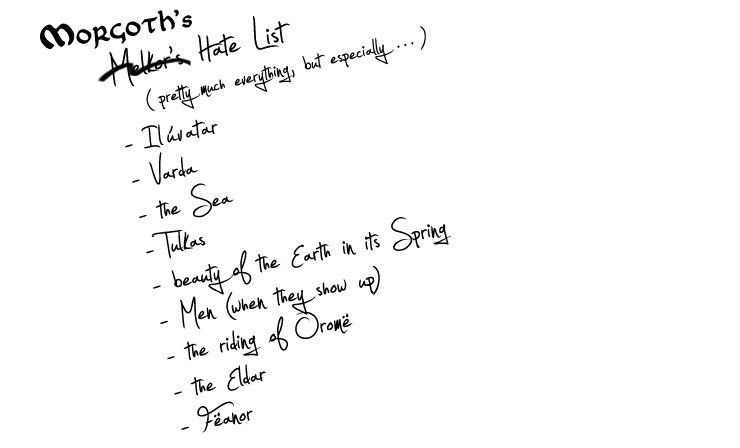
Fëanor is now doubly pissed at Manwë for having summoned him to Taniquetil in the first place—never mind why—because if he’d only been home in Formenos, maybe he could have kept Morgoth at bay. So he leaves the rest of the Noldor and the Valar to their own grief and runs home. And to Fëanor’s credit—despite all the terrible things that will follow—we’re told that Finwë was “dearer to him than the Light of Valinor or the peerless works of his hands…” Meaning even his dad meant more to him than the Silmarils—not by much, but when you consider how insanely obsessed he has become for the work of his own hands, Finwë must have been dear indeed.
Now we cut over to Morgoth himself, who probably doesn’t yet know that he totally got served has been renamed. Even so, he’s running across the wastes of Araman—the region north of Valinor on the continent of Aman—because you can bet Oromë and Tulkas will be hot on his tail soon. This time he is headed for Middle-earth, where Sauron and the Balrogs better not have turned his bedroom into a den. I mean, he’s only been away for three ages! C’mon, we’re all immortal here, right?
At one time, he might have just been able to eschew his physical form, go all ghostly and naked across the landscape—maybe even right over the Great Sea itself—to make short work of this trip. But he’s spent too much of himself and lost that ability, remember? He’s stuck in Dark Lord form forever now.

Plus he’s got the Silmarils and a bunch of other gems to carry. He’s can’t just pop those into a Bag of Holding. And no way would he travel by sea—that’s Ulmo’s turf! Things are about to go south for Morgoth…even though he’s technically going north. Because with him still is his hideous, eight-legged, light-sucking accomplice. Don’t forget her! (It’s hard to, once you’ve seen her.)
Ungoliant and Morgoth finally reach that land of unforgiving cold that serves as a bridge between the northern tips of Aman and Middle-earth. Known as the Grinding Ice, this arctic realm is called the Helcaraxë (hell-car-AX-ay)! It should surprise no one that this very devastatingly cool word is also the name of multiple real life death metal bands, from such badass places like Black River (Argentina), Bratislava (Slovakia), and…New Jersey.
It’s become clear to Ungoliant that Morgoth is trying to shake her. Now that their heist was a success, she’s apparently cramping his style. Plus let’s be honest: she’s also really freaking scary. Ever since the Trees, she’s only gotten bigger. Her cloying darkness hangs over them both, and she doesn’t let him out of her sight. The dude had made some pretty big promises back there—no way is he giving her the slip! You agree to go on a date with a monstrous black spider from the outer edges of the World, you better see it through.
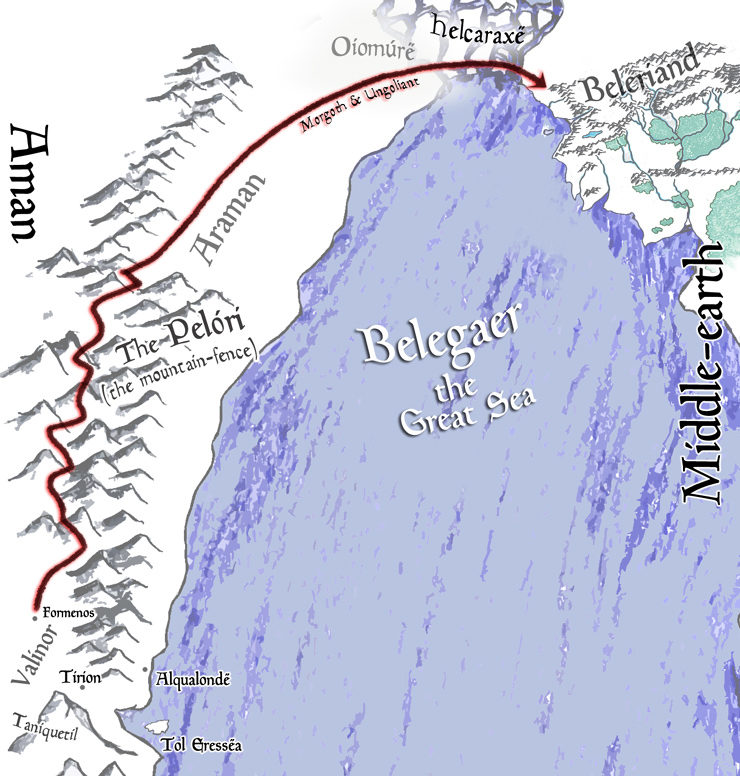
So they cross the icy hellscape with an ease that only nigh-invincible immortals possess, and finally start in on Middle-earth itself. Morgoth has his sights on Angband, that western fortress where he’d left Sauron in charge (although Sauron had made himself scarce when Tulkas and the Valar had come bursting in to wreck the place). Realizing that once Morgoth is back at his pad, he’ll will be harder to manage, Ungoliant stops him short. She reminds him that she’s still hungry. And she knows he’s got some bright and tasty snacks in hand. Literally.
And he’s all like, hey, babe, it’s not like he promised her the whole world.
‘Not so much,’ said Ungoliant. ‘But thou hast a great treasure from Formenos; I will have all that. Yea, with both hands thou shalt give it.’
Oh snap! She throws his words back at him.
So Morgoth opens up his left hand and gives her all the shiny Noldorin gems that he’d stolen; not the gems, of course, but other treasures of Fëanor’s. She devours these, then demands what’s in his other hand, in which he clutches the three Silmarils housed in a crystal casket. Even through this compartment, they’ve begun to burn him (what with his “hands unclean” and “evil will,” per the terms of Varda’s hallowing), but he hasn’t let them go for even a second. Murdering the Trees of Valinor and Finwë had been a point of vengeance, but the Silmarils—which he’s been drooling over ever since he first laid eyes on them—had been the real prize.
So now we come to it, the breaking part of this particular relationship.
‘Nay!’ he said. ‘Thou hast had thy due. For with my power that I put into thee thy work was accomplished. I need thee no more. These things thou shalt not have, nor see. I name them unto myself for ever.’
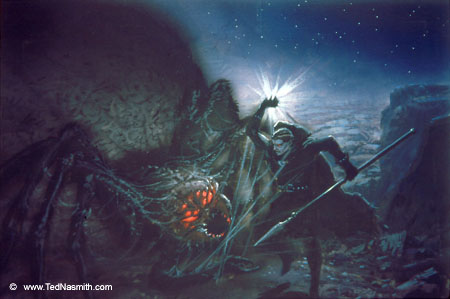
Naturally, an altercation ensues. Morgoth might have been the “mightiest dweller in Eä” at some point in his career, but that’s becoming less true as time goes by. And now he’s been weakened by his part in Ungoliant’s empowerment, so she’s got the upper hand, as it were. She spins her “web of clinging thongs” around him, tangling him up. And then Morgoth does what all bad guys do when faced with their well-deserved comeuppance. He protests. He screams.
So loud is this cry that (1) it gives the place its name—Lammoth, the Great Echo—and (2) it reaches across the canyons and valleys of northern Beleriand, reverberates into Angband itself and down into its deep chambers. It stirs up the Balrogs who’ve been hiding out there. They’ve got great ears, it turns out, if not weight-bearing wings. (Discuss!) So up comes the Balrog Brigade (a term I want to exist but Tolkien certainly didn’t use). They come leaping out of their holes and rush across the mountainous terrain to the rescue of their Dark Lord, whom they have been waiting for faithfully.
Balrogs join the fray—which might have been brief, but could just as likely have taken days! With their fiery whips they burn away Ungoliant’s webs and ultimately drive her away. She could probably take out any of them individually, but they’ve got the numbers on her.
![[FYI, if anyone ever tells you Balrogs have wings, fair enough; they’re more likely to be metaphoric, but hey, whatever. In any case, Balrogs cannot fly. Which is not to say they can’t be shown as having wings in artwork. I would argue, at best, that Balrogs can glide.]](https://reactormag.com/wp-content/uploads/2018/01/dark_lore_of_lotr___into_th-740x559.jpg)
Morgoth may be an unspeakable asshole who uses Elves, Valar, and terrifying spider ladies for his own selfish reasons, but he does have a posse. His Balrog bros got his back.
So, Ungoliant flees, but there’s no going back to her mountain clefts in Aman—the Valar would surely look for her now—so she finds somewhere new to hide and nest in Beleriand. (A reminder: Beleriand is that whole northwestern region of Middle-earth where the rest of the Silmarillion will largely take place.) But really, thanks a lot, Morgoth! As if he hasn’t done enough rotten things to Middle-earth already, now he’s let in an invasive species to breed with the local, native spider monster population. And breed she does! In a dark valley beneath Ered Gorgoroth, the Mountains of Terror, Ungoliant settles in. And because she won’t be coming back into the story again after this, Tolkien gives us a brief forecast of her fate.
First, we’re told that “other foul creatures of spider form” have been living here since Morgoth’s previous occupancy of the region—likely more beasties of Yavanna’s natural world that had been tampered with by Morgoth in his mightier Melkor days. Well, we’re told that Ungoliant mates with these things before devouring them—double gross—and Eru knows how many broods of oversized, many-legged critters issue forth from her reproductive system over the ages!
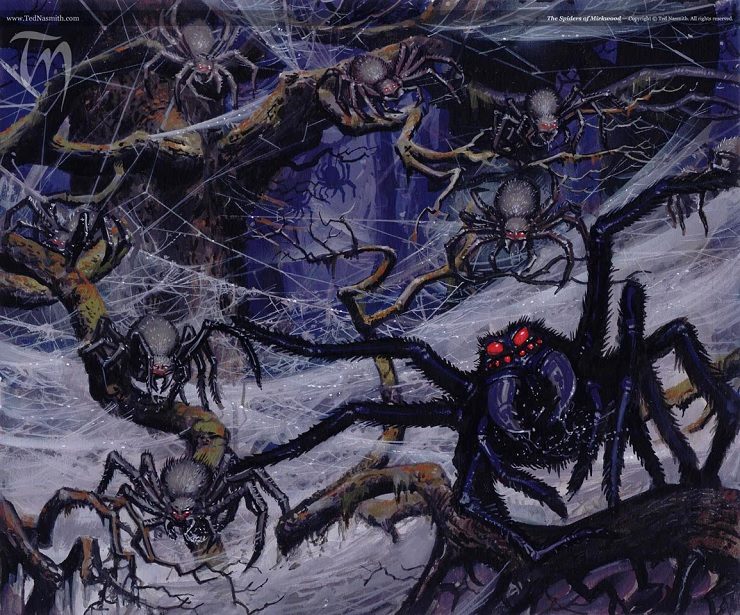
At some point, though, this spider granny does leave even her lair in Ered Gorgoroth, after which no one ever hears of her again. Speculation is made that Ungoliant’s curse of always being hungry finally consumes her. Like, literally. For in her “uttermost famine she devoured herself at last.” Which is a gruesome image but also otherwordly. Being an ancient spirit from beyond Arda, anything’s possible—what does that even look like? Gross, no matter what.
But back to the present. Free of Ungoliant, Morgoth now takes charge of Angband and settles in for good. Presumably, Sauron, who used to be the leader of this base, is at some point sent abroad (we’ll find out where in a future chapter). Morgoth fortifies and rebuilds Angband—aka the Hells of Iron—and “rears” three gigantic mountains above it just to make it more badass. Together these three volcanic peaks are called Thangorodrim (than-GOH-roh-dreem) and they’ll become a metonym for Morgoth’s power…
and a great reek of dark smoke was ever wreathed about them. There countless became the hosts of his beasts and his demons, and the race of the Orcs, bred long before, grew and multiplied in the bowels of the earth.
So Morgoth digs up his old specs on mass Orc-production and gets it going again. Think of all that smelting and smoke and stink of Isengard in The Lord of the Rings, then add Mount Doom and the Dark Tower of Barad-dûr, and then magnify that a hundredfold. Sprinkle some Balrogs on top and add a dollop of discord. That’s Thangorodrim.
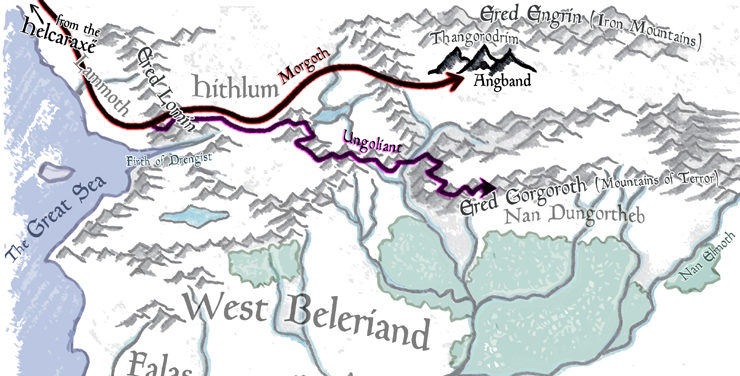
As for those Silmarils: Morgoth is still burned by their presence; he can’t properly touch them or grasp them like a stress reliever on his desk. And they’re too majestic to use as doorstops or paperweights. So he does what any self-respecting Dark Lord would do: he forges a crown of iron, sets the Silmarils into it, then places it on his head. Sure, he suffers from their proximity—“nor was he ever free from the pain of the burning, and the anger of the pain”—but out of sheer inescapable spite, he bears it. And it only seems to get heavier over time.
But still, very metal of him.
So there, sitting upon his throne deep underground and far from the sight of most of his so-called subjects, Morgoth declares himself King of the World. And it’s pathetic, but also horrific, for so much suffering will come of his presence and his works, even though we’re told that he ventures forth from his halls only once more of his own accord. Hence the rest of the Quenta Silmarillion.
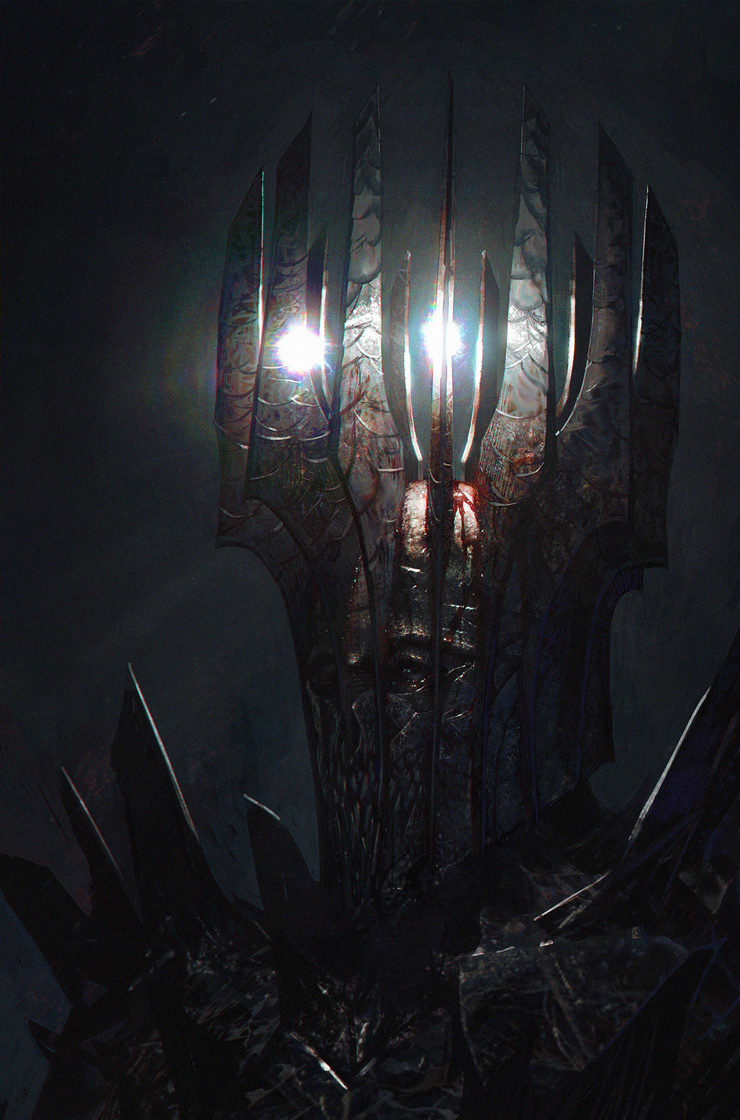
Now back to Valinor! Time passes. The Valar sit in thought for a long time. Again. Their Maiar and Vanyar friends continue to mourn over the death of the Trees, while the Noldor have all gone back to their city of Tirion to cope with the death of their king—upper lips kept as stiff as possible, given the circumstances.
Then Fëanor shows up in Tirion, breaking his exile, and calls everyone to come listen to him. Of course, all the Noldor turn out to hear what he has to say, gathering in the streets and stairs with torches in hand (remember, it’s pretty dark now). And at last, Fëanor puts his money where his mouth is, calling for a rebellion against the Valar. His mother had named him “spirit of fire,” and on this day he really proves why. Despite his harsh anti-Valar rhetoric, the Noldor generally do love Fëanor. He’ll soon be testing the limits of that love.
For now, they’re caught up in his “fierce and fell” demagogical speech, and are in fact “stirred to madness” by it. Fëanor even claims the kingship of the Noldor, now that his father the High King is dead. (Long live the High King!) He then calls on them all to leave Valinor with him, to rage-quit the whole shebang, and bring pursuit and vengeance to Morgoth.
To return to Middle-earth…this time with swords.
Feanor insists that the Valar are jealous and irresponsible, and he parrots, if unknowingly, the lies of Morgoth. Sure, he reviles the Dark Enemy of the World above all, because that’s the one one guy absolutely everyone now hates. But as a means to the end that he’s trying to achieve, Fëanor throws the Valar under the bus, rolling out his all-who-stay-here-are-just-thralls talk anew. He even plays the “Men” card again, and this is actually the first time some of the Noldor are even hearing about this. Those Men!…amirite, Eldar? Never mind that the Secondborn Children of Ilúvatar—who still, by the way, haven’t even shown up yet—are guilty of exactly diddly-squat. Fëanor claims the Valar, the “kin of my father’s slayer,” have brought the Elves to Valinor so that “Men might rule in Middle-earth.” Of course, this is all right out of Morgoth’s playbook.
Here’s the thing: Fëanor is an excellent orator, yes, but what makes his speech especially compelling is the fact that he’s not totally wrong. Not the master/slave stuff—that’s rubbish. And the Men-will-take-over bit? Horsefeathers! But the Elves coming to Valinor in the first place, rather than staying in Middle-earth, might indeed have been overreach on the part of the Valar. And they have allowed Morgoth to operate among them. So now Fëanor is insisting that his people, the Noldor, can achieve what the Valar have not—that they can “go further than Oromë” and “endure longer than Tulkas.” The Noldor, he is saying, will never give up! They will pursue Morgoth back to Middle-earth, return to the land from whence they came, regain the Silmarils, and then establish new realms and be “masters of the bliss and beauty of Arda.”
And, well, some of that will happen. Some.
Fëanor knows how to appeal to the pride of his kin. He cites Cuiviénen, a place he’s too young to have ever seen himself, and how “sweet ran the waters under unclouded stars.” Hearts are moved. A longing for the twilit Middle-earth is kindled anew.
Re: the Silmarils, however, Fëanor caps off his speech with the Oath to End All Oaths. It is one that will both spur Fëanor and his seven sons to action and yet haunt them forever. Now, while this terrible oath of “dread words” applies only to him and to his kids, and only they make the oath, it’s going to affect everyone. And I mean everyone.
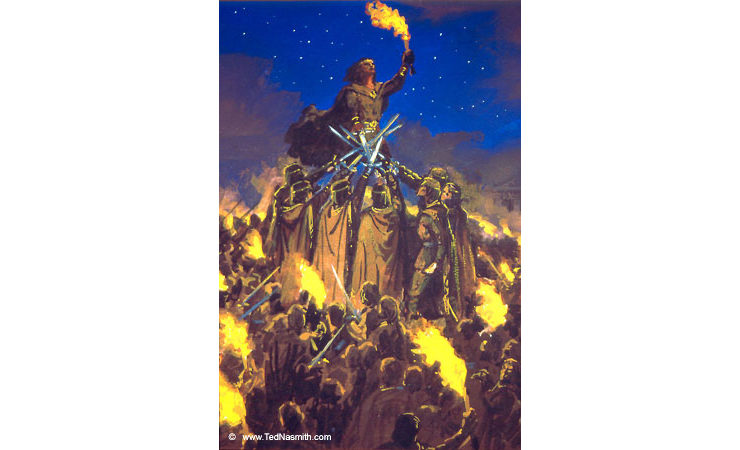
This is something that Fëanor, at the height of his hubris, does with all of the Noldor and the Valar as witnesses. He especially calls out Manwë and Varda—who are totally hearing and seeing all of this up on hallowed Taniquetil.
As for the content of this oath, well, it could be simplified by saying this: if you grab or retain a Silmaril—hell, if you even look at one funny—Fëanor & Sons will be coming for you. Your ass is grass.
Or, consider this flowchart which some Noldor lawyer could have put together.
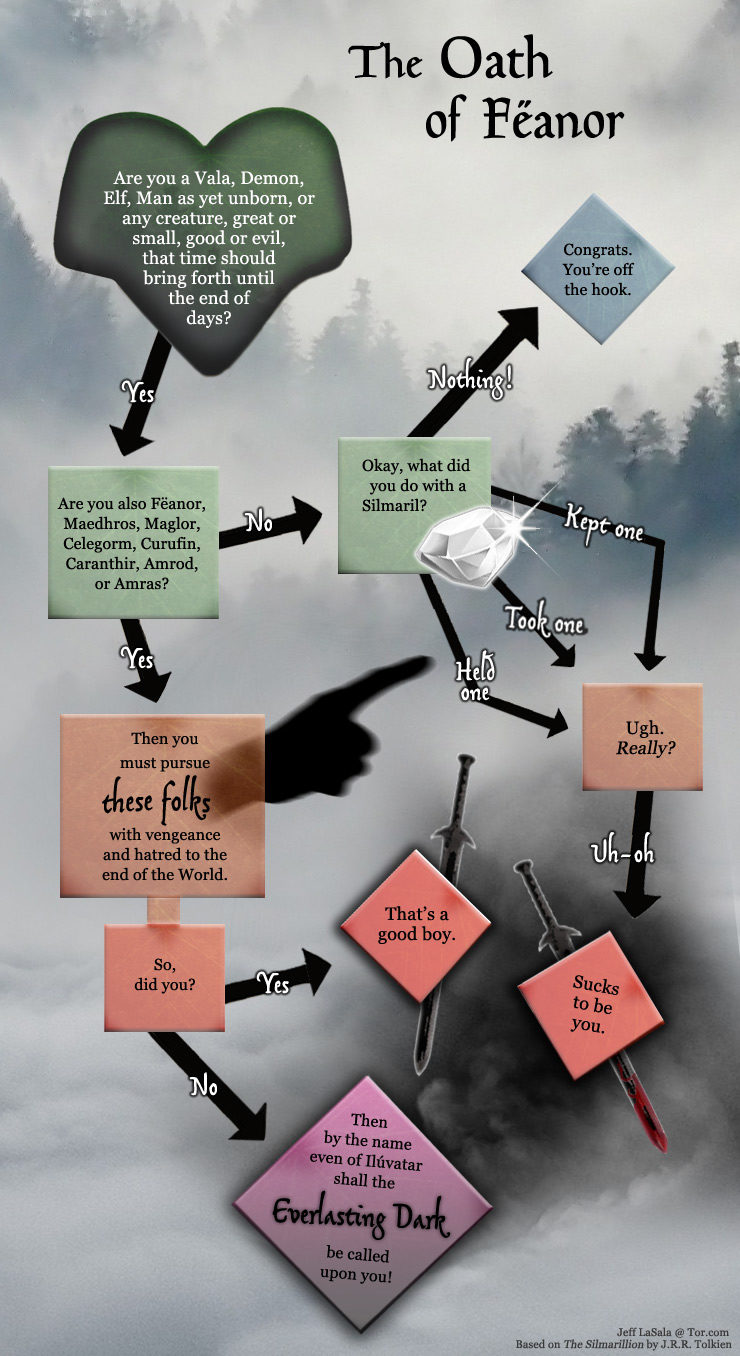
It’s a rather alarming set of rules, though. Can you imagine standing between, say, the brothers Amrod and Amras, and then Amras asks you hand to him a Silmaril that Amrod is currently holding? I mean, first you’d better be clear that you’re not taking the Silmaril from Amrod but only receiving it; and you can’t hold onto it even for a moment; and you’d better hurry it over to Amras quickly or else you could be construed as keeping it. That’s one hot potato!
Meanwhile, the actual Silmarils are thousands of miles away in the possession of Morgoth, literally affixed to his head with a black crown, with no chance of anyone else holding, taking, or keeping one anytime soon. So this oath is just warning everyone well in advance that the Silmarils are the Property of Fëanor & Sons only. Note that by default Morgoth is already, according to the oath, on notice: he’s held, taken, and kept all three Silmarils. Damn.
But geez, man. This solemn oath is made right after Fëanor’s stirred up the hearts of the Noldor to set out on a long journey. Only he would have the guts (or the gall) to speak to his people and on their behalf, ask them all to uproot their lives and follow him into great hardship, then immediately threaten all of them.
In the next installment, we’ll tackle the second half of this chapter. Who will Fëanor antagonize next? Will the Noldor really follow him on this ill-advised flight? What about Fingolfin? Or Galadriel?! Will she stay in Valinor and therefore avoid entanglement in Middle-earth’s toxic politics? Is Manwë gonna stand for all this? Will Mandos put in his two cents? Will Nienna ever stop crying? WHAT HAPPENS NEXT?
Top image: “Morgoth” by Frédéric Bennett”
Jeff LaSala generally tries to avoid taking ominous Fëanorian oaths. Tolkien nerdom aside, he wrote a Scribe Award–nominated D&D novel, produced some cyberpunk stories, and now works for Tor Books.










